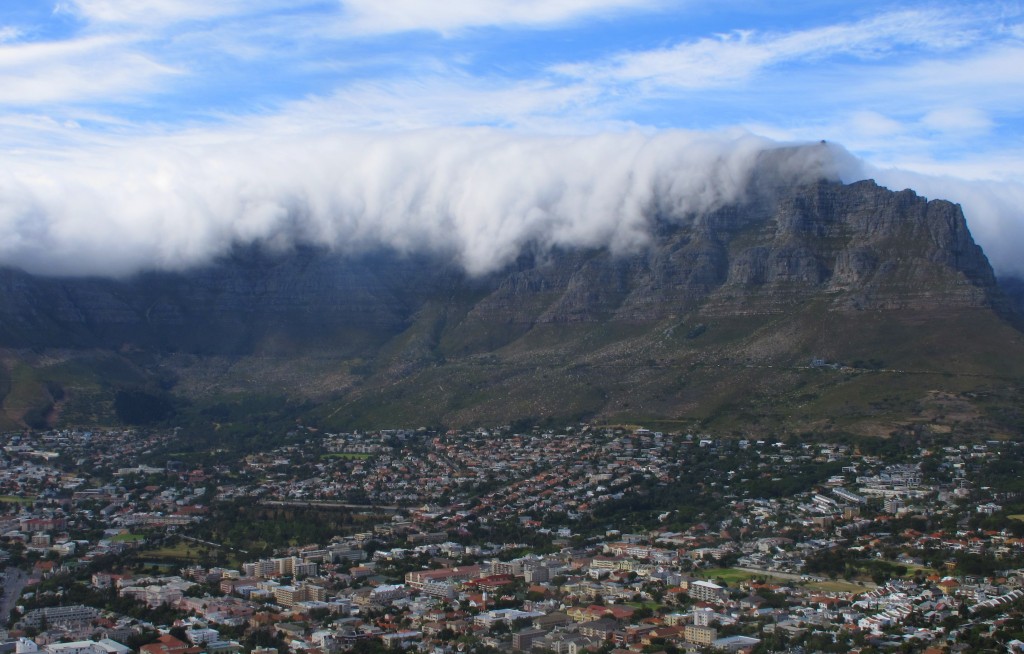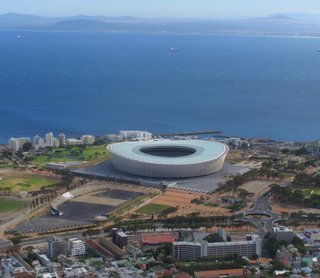Biking. Beauty. Kabul? Cape Town, South Africa.
8 Jan
“OMG. You live in Kabul? Tell me, why are we in Afghanistan? I’m American. We talk in sound bites.. Help me here…”
So, that was the first thing that spewed from my mouth after meeting Suzanne and Gustav. Poor people. Suzanne is German and is married to Gustav, a South African who owns Bike & Saddle, a leading eco-active travel company based in Cape Town. They married ten years ago, and she works for the World Bank. They’ve lived in DC and Madagascar. She now lives in Cape Town and commutes to Kabul – eight weeks on and two weeks off.
 Earlier that day, I did ANOTHER bike tour with Gustav’s company. This one was around the Cape. More strenuous stretches up mountains, down hills, through canyons to explore the beauty of South Africa.
Earlier that day, I did ANOTHER bike tour with Gustav’s company. This one was around the Cape. More strenuous stretches up mountains, down hills, through canyons to explore the beauty of South Africa.
The challenge was the gale force winds. Can’t ride a bike up a mountain when you see birds flapping their wings, going backwards. They call the winds the “South-Easterlies.” I call it bad for biking.
I can not put into words the beauty of Cape Town. It’s California and France’s
coasts on crack. Plus, it has a cosmopolitan flare with its robots, organic supermarkets, and Woolworths.
That’s right. Woolworths still exits! I was shocked. I thought it went bankrupt. I have fond memories of going to the Winter Park Mall and eating grill cheeses with my grandmother at Woolworth’s cafe. It’s not the same in South Africa. No selling of plastic flowers and toy guns. Woolies, as the local’s refer to it, is equivalent to our Whole Foods and any upscale department store.
 Back to biking. Gustav’s travel company had a bus follow us as we attempted to peddle. Short story, longer. We opted to put the bikes in the van and see the sights from the confines of a sheet metal to better protect us from sand, wind or fire.
Back to biking. Gustav’s travel company had a bus follow us as we attempted to peddle. Short story, longer. We opted to put the bikes in the van and see the sights from the confines of a sheet metal to better protect us from sand, wind or fire.
That’s right. Fire. The mountain next to my hotel was burning. The firefighters managed to get it under control with the help of four helicopters and a reservoir.
That evening, Gustav asked if he and his wife could join me for dinner. I have no friends here…. So, guess what was the answer? They picked me up from the Lady Hamilton Hotel and off we went to the waterfront to dine. It was there, when I asked Suzanne what she did for a living. She said, “I work for the World Bank in Afghanistan. I’m based in Kabul…” That was when, I hurled a zillion questions at her. Poor lady. She thought she was going to have a very nice evening. Nope. Not with the inquisitive Tallgirl…
 All I wanted was a soundbite. I mean, I’m American. And, we Americans, don’t have patience for details.
All I wanted was a soundbite. I mean, I’m American. And, we Americans, don’t have patience for details.
You have our attention for 45 seconds on a good day. So, what is the value proposition here? Below is an edited recap of our conversation – for the wine flowed and consumption was the name of the game.
Suzanne: “There are 26 or 27 countries in Afghanistan, some with only a few thousand troops.”
Me: “Whose running the show? Americans?”
Suzanne: “No one, really. That is part of the problem. The countries who are there have their own territories they are monitoring. So, their focus is just on that area. For example, Italians are in one providence and when they invest $$ or more troops, it can only go to that area so they can get credit for it back home. It makes it difficult to make decisions from a global sense.
The Afghans are tired. Back in 2001, they welcomed Americans and the international communities’ help. They wanted to kick out Al-Queda. They were tired of being under their control. Kabul used to be a cultured, polished, worldly city. The Afghans wanted it back. The international community promised a lot.
Afghans waited and waited and waited. Then, Iraq happened and all attention, resources and promises went to Iraq. Once again, Afghans were left holding the bag, with nothing. History repeats itself. Their trust evaporated, and they went back to trusting Al-Queda.
Now, we’re at 2010 and, promising a lot, yet at the same time, telling them we’re leaving in a year or two. Why trust and work with the international community when they are going to leave again – leave them with nothing. It will take more than a year, two or even ten to bring any sense of stability to the region. This is a long term investment….
In the meantime, you have complications with Pakistan. Then, there is India. And, you have a country – Afghanistan – that is mineral rich and, possibly, oil/gas rich. The Chinese are buying up mineral rights now. They see Afghanistan as a long term investment. Chinese have a different sense of time. They can wait 50 to 70 years, without a problem. China is in Afghanistan. So, is the US Geological Service too. All trying to understand what lays underneath the country’s surface.
What is hard to understand is there are sooo many brilliant American minds? So, many who have studied at the War Colleges. Tremendous experience. Yes, they forget Afghan history. Or, neglect to examine past mistakes.
And, then there is this void. No one wants to make decisions. And, it seems, some are more concerned about their careers with the Obama administration than the long term health of the country. This makes it hard to move anything forward. There is no clear direction, from nobody.
Afghan people are beautiful. The country is breathtaking. One day, it will be a tourists paradise with its mountains and vastness. The people find it hard to trust….
————————————————
Suzanne continued to share much more details about how complicated it is. But, our conversation left me sad. Sad there is a void in leadership. And, it’s unfair. Unfair to the people of Afghanistan and to those countries investing in a better Afghan future. Unfair because innocent people are dying for no one knows who is on First, Second or Third.
And, what are they risking their lives for? Can you imagine being in the US military. On the front lines, and every week or day you hear a different reason why you are sacrificing your life? Irritated, to say the least. Can you imagine being an Afghan and every week or day, you hear a different reason why you’re being occupied. Irritated, to say the least.
Boils down to communications. Can’t trust, if you don’t understand. Can’t understand, if you don’t communicate. And, can’t communicate, what you don’t know… Why do we make things so hard…. Why?



Comments